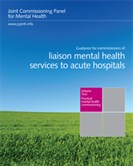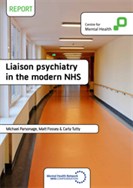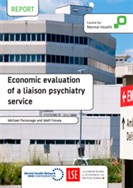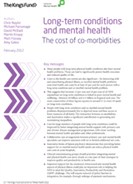We provide assessment, formulation and individually tailored interventions for a wide range of psychological and psychiatric difficulties in physical health problems.
In February 2011, the Department of Health published No Health Without Mental Health - its strategy for mental health in England. One high-level objective, calling attention to the close interplay between physical and mental health, is to improve the mental wellbeing of people with physical ill health.
An evidence-based speciality
Evidence from a range of sources suggests psychological medicine reduces hospital re-attendance by people with mental health problems and reduces re-admissions and length of stay.
Shaping the future
As part of a holistic evidence-based approach to healthcare, Royal Brompton & Harefield NHS Foundation Trust is aware of the impact unrecognised and under-treated mental health difficulties can have on physical health recovery and wider quality of life so has a well developed psychological medicine service operating at both main hospital sites, available to inpatients and outpatients.
Problems referred to psychological medicine include:
- Psychological reactions to physical illness
- Deliberate self-harm
- Organic mental disorders, ie: delirium and dementia
- Coping with issues related to transplant
- Adherence to medical management
- Alcohol and substance misuse
- Behavioural disturbance
- Mood and anxiety disorders
- Medically unexplained symptoms
- Bereavement
Proud of our outcomes
Quality clinical outcomes are increasingly delivered by multidisciplinary teams and the Trust is especially proud to shape future care with services such as psychological medicine embedded within a diverse range of specialist teams, committed to treating the whole person.
Key evidence and policy documents driving the development of quality psychological medicine services
Psychological medicine services provide mental health care to people being treated for physical health conditions in general hospitals. The co-occurrence of mental and physical health problems is very common among these patients, often leading to poorer health outcomes and increased healthcare costs. An effective psychological service offers the prospect of saving money as well as improving health.
People who have a long-term physical health condition are more than twice as likely to have a mental health problem as the general population. This can have a huge effect on a patient's chances of recovery. Altogether, there are more than 4.6 million people with a long-term physical health condition and co-morbid mental health problem, all of whom would benefit from more integrated physical and mental health care.
Half of all hospital inpatients have mental health conditions such as depression and dementia. Identifying and managing these conditions quickly and effectively helps people to recover and reduces their length of stay in hospital.
Evidence and policies
A range of reports and policy documents are outlined by The British Psychological Society's faculty of clinical health psychology and the Royal College of Psychiatrists' faculty of liaison psychiatry. Overviews of some of these reports are given below.
Guidance for commissioners
Guidance for commissioners of liaison mental health services to acute hospitals (volume two), 2012 
This guide outlines best practice for modern acute liaison services. It is of interest to clinical commissioning groups (who will be commissioning specialist mental and acute secondary services) and was written by a group of acute liaison experts in consultation with patients and carers.
It also addresses issues relating to the commissioning of acute liaison services, such as:
- The benefits
- The optimum liaison psychiatry team
- The mental health needs in acute care settings that a liaison service addresses
- Why a liaison service is important for commissioners of acute hospital services
The guide draws on and refers to previously published guidance, including:
- The Royal College of Psychiatrists' Centre for Quality Improvement PLAN standards
- The Royal College of Psychiatrists CCQI Mental Health Policy Implementation Guide for Liaison Psychiatry and Psychological Medicine in the General Hospital
- The Royal College of Psychiatrists briefing No Health without Mental Health: the Supporting Evidence
- The NHS Confederation briefing Healthy Mind, Healthy Body.
Liaison psychiatry in the modern NHS
Liaison psychiatry in the modern NHS, 2012 
This report states that liaison psychiatry services can save hospitals around £5 million a year by reducing the number and length of admissions. It also says that substantial future savings could be achieved if liaison psychiatry services were rolled out in the community, therefore preventing crises from happening at all.
As well as finding that well-run liaison psychiatry services can be highly cost-effective, the report also noted that they can achieve immediate impact by supporting older patients in hospital. Liaison psychiatry services can also potentially provide better care at a lower cost to other groups, both in hospital and the community.
The report highlighted that:
- Every general and acute hospital should have a dedicated liaison psychiatry service, which responds to local needs and is established on a sustainable basis
- Liaison psychiatry services should aim to fully integrate psychiatry and psychology in medical care
- Where liaison psychiatry support is restricted or does not exist, the first priority should be setting up a generic rapid-response service, which should provide liaison psychiatry support for all ages and conditions where possible
- A main role for liaison psychiatry services should be training and supervision of acute hospital staff
- Outpatient treatment clinics need to focus on conditions that are shown to be not generally well managed in the community, such as medically unexplained symptoms and self-harm
An evaluation of a liaison psychiatry service
Economic evaluation of a liaison psychiatry service, 2011 
This evaluation looks at the costs and benefits of the Rapid Assessment Interface and Discharge (RAID) psychiatric liaison service at City Hospital, Birmingham – a service which offers comprehensive, 24-hour mental health support to adult patients.
The financial savings generated within the hospital by RAID significantly outweigh the running costs of the service. The service grew from a small liaison psychiatry team in 2009 and, in its current form, is estimated to have cut the costs of bed use within the hospital by around £3.5 million annually.
Most of the savings generated by the service are from shorter stays and reduced re-admissions of elderly patients. Further savings are hoped to be generated by an increase in the number of older patients being discharged to their own homes rather than residential care.
Long-term conditions and mental health
Long-term conditions and mental health: the cost of comorbidities, 2012 
This is a joint report between the Centre for Mental Health and The King's Fund, which found that the extra cost of treating long-term conditions for people with depression and other mental health problems is £8–13 billion a year.
Many people who have long-term physical health conditions also have mental health problems, which can lead to poorer health outcomes and a reduced quality of life.
This can also mean significant costs for the healthcare system. Comorbid mental health problems can raise healthcare costs by at least 45 percent for every patient who has a long-term condition, suggesting that between 12 and 18 percent of all NHS expenditure on long-term conditions is linked to poor mental health and wellbeing.
Integrated working between mental health support and primary care / chronic disease management programmes could improve the care provided for more people with long-term conditions and potentially improve outcomes with no or limited additional net costs.
New methods used in liaison psychiatry show that providing improved support for comorbid mental health needs can reduce healthcare costs in acute hospitals. Therefore, this report states that clinical commissioning groups should prioritise integrated mental
and physical healthcare in their strategies to advance quality and productivity in healthcare.
Training and research
Psychology trainees
A range of training placements are hosted within the department, including clinical psychology and psychiatric training rotations. Psychology trainees have come from UEL, Royal Holloway, Salomons and UCL training schemes. Trainees from other schemes can be arranged on request. Psychology leads at both Royal Brompton and Harefield hospitals have links with a range of training schemes and can be contacted directly to discuss proposed placements.
Psychiatry trainees
Special interest sessions can also be arranged for senior psychiatry trainees (ST4-6) from the west London and central and north-west London training rotations, with supervision from the consultant psychiatrist who also holds an honorary consultant contract with Central and North West London NHS Foundation Trust.
Posts can be developed to meet the needs of individual trainees, subject to discussion, at either of the Trust sites (Royal Brompton Hospital London, SW3, or Harefield Hospital near Uxbridge, Middlesex).
Royal Brompton and Harefield hospitals make up the largest specialist heart and lung centre in the UK and among the largest in Europe. It is a partnership of two specialist hospitals which are known throughout the world for their expertise, standard of care and research success in cardiorespiratory medicine and surgery and has a worldwide reputation for heart and lung research.
The psychological medicine service comprises a part-time consultant psychiatrist, full-time psychiatric nurse and team of psychologists providing inpatient and outpatient input to a wide range of specialist services, including heart and lung transplant teams, cystic fibrosis, interstitial lung disease, ITU, sleep disorders, asthma, COPD, pulmonary hypertension and congenital heart disease. Common disorders seen include anxiety, depression, adjustment disorders, and acute confusional states and psychosis on ITU and post-operative wards; alongside more unusual presentations, such as immunosuppressant-induced cognitive dysfunction and neuropsychiatric conditions. The post would therefore offer the possibility of a wide range of experience in multiple settings with ample scope for research and audit projects which we would be very keen to support.
There is no A&E department in this Trust and any posts would be subject to obtaining an honorary clinical contract with which we can assist.
For expressions of interest and to discuss further, please contact consultant psychiatrist Dr James Woolley.
Previous placements have been highly recommended by trainees and offer ample scope for audit and research alongside varied clinical experience.
Audit and research topics
Possible future areas for audit and research include:
- Internet-based group for cystic fibrosis sufferers
- Anxiety/relaxation prior to surgery - psychological preparation for surgery
- Qualitative study into experiences of extracorporeal membrane oxygenation (ECMO)
- Experience of being on transplant waiting list
- Ventricular assist devices - patients' and caregivers' qualitative and quantitative outcome measures
- Patient satisfaction/experience regarding general anaesthetic during bronchoscopies
- Experience of inpatient transplant assessment
- Inpatient stay experience
- Parents and partners staying during admissions
- Men with cystic fibrosis planning families
- Relationships with individuals who have life-limiting illnesses
- Psychological morbidity prevalence study in sleep and ventilation patients
- Prevalence of sexual difficulties in ventricular assist device patients
- Experiences of parenting a child with cystic fibrosis
- Effects of being on urgent transplant list for patient who are parents
- Prevention of delirium in intensive care
Published work
Clinicians in the psychological medicine team at Royal Brompton & Harefield NHS Foundation Trust have been involved in a number of published papers, some of which are selected below:
- Bedair R, Babu-Narayan SV, Dimopoulos K, Quyam S, Doyle AM, Swan L, Gatzoulis MA, Wong T (2014) Acceptance and psychological impact of implantable defibrillators amongst adults with congenital heart disease. International Journal of Cardiology 181C: 218-224. doi: 10.1016/j.ijcard.2014.12.028
- Yorke J, Fleming S, Shuldham C, Doyle AM, Menzies-Gow A, Adair P, Dubrow-Marshall L, Caress A, Niven R (2013) Feasibility and acceptability of group-CBT for people with severe asthma. European Respiratory Journal 42(Suppl 57): 213
- Kapoor S, Sarridou D, Lees N, Carby M, Woolley J, Mitchell J (2015) Anaesthetic techniques and considerations for bronchoscopy after lung transplantation: audit on patient satisfaction and experiences from a tertiary cardiothoracic and transplant centre. European Journal of Anaesthesiology (to be published in May 2015)
